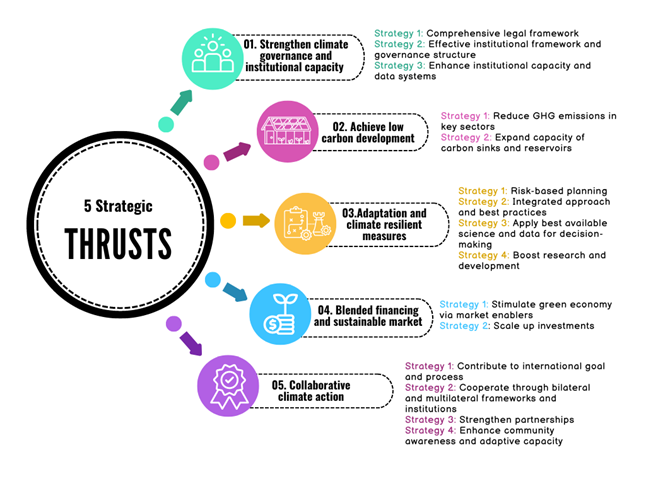Last Monday, in a decisive move towards a more sustainable and resilient future, the Ministry of National Resources and Environmental Sustainability of Malaysia unveiled its National Climate Change Policy 2.0 (“Policy 2.0”). While the first National Climate Change Policy was introduced in 2009 to mainstream climate action into the national development agenda, Policy 2.0 aims to reaffirm the country’s response to climate change by introducing a new framework for Malaysia’s transition towards a low-carbon economy. It will also serve as the backbone for drafting the Climate Change Act, slated for early 2025.
“… [A] living document that is subject to periodic reviews and updates to ensure that it remains relevant, effective, and responsive to the evolving climate change landscape. ”
Policy 2.0 is an umbrella policy that ties together all climate initiatives and provides guidelines for governance, low-carbon development, adaptation, climate financing, and cross-border partnerships. It aligns with recent strategic initiatives, such as the National Energy Transition Roadmap and the New Industrial Master Plan 2019-2030. Policy 2.0 is timely not only to fulfil Malaysia’s commitment and pledges to the Paris Agreement and various multilateral environmental agreements but also to address the steady increase in greenhouse gas emissions (“GHG”) and climate change impacts to Malaysia.
Structure
Building upon the first policy, the objectives of Policy 2.0 include:
Policy 2.0 will also be guided by four central principles, namely:
Policy 2.0 has described five Strategic Thrusts with accompanying strategies and four enablers as guidance towards the transition towards a low-carbon economy and to meet the objectives of the policy.

Policy 2.0 also describes 92 key actions under the strategic trusts to facilitate more significant policy outcomes. The progress of Policy 2.0 will be monitored and reviewed to continuously track and assess the results of Malaysia’s climate action efforts and evaluate the effectiveness of the policy instruments in achieving the objectives of Policy 2.0. This approach treats Policy 2.0 as a living document that is subject to periodic reviews and updates to ensure that it remains relevant, effective, and responsive to the evolving climate change landscape.
Thoughts
Policy 2.0 highlights the urgency of addressing climate challenges while presenting a holistic approach that intertwines environmental sustainability with economic development and social well-being. By prioritising sustainable practices across various sectors, Malaysia can enhance its resilience to climate impacts, create green jobs, and foster innovation. Furthermore, engaging communities and raising awareness will empower individuals to take part in climate action, ensuring that sustainability becomes a shared responsibility and drives lasting change from the ground up. As we move forward, collaboration among all stakeholders will be vital, as a united front can drive meaningful change.
If you have any queries, please contact the author, Joyce Ong Kar Yee (oky@lh-ag.com), Partner in the ESG and Sustainability Practice.